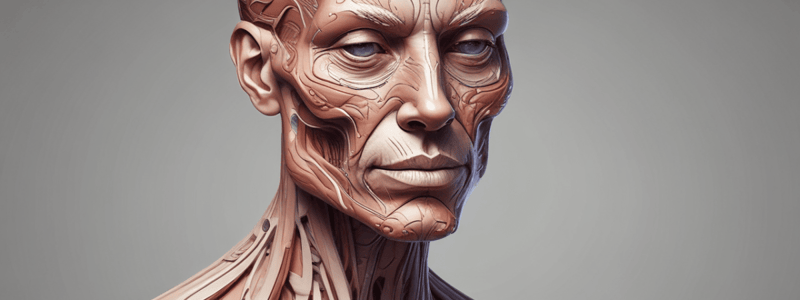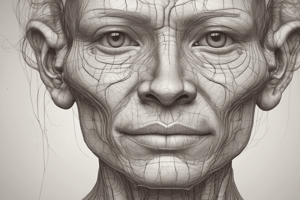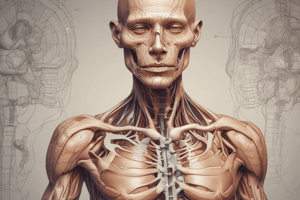Podcast
Questions and Answers
What percentage of the body's blood flows through the dermis?
What percentage of the body's blood flows through the dermis?
- 15%
- 10%
- 25% (correct)
- 20%
What is the function of arrector pili muscles in the body?
What is the function of arrector pili muscles in the body?
- To regulate blood vessel diameter
- To trap warm air close to the skin (correct)
- To detect nerve endings
- To produce sweat
What percentage of an individual's natural weight is accounted for by the skin?
What percentage of an individual's natural weight is accounted for by the skin?
- 20%
- 16% (correct)
- 25%
- 10%
Where are hair follicles not found in the body?
Where are hair follicles not found in the body?
What is the function of sweat glands in the skin?
What is the function of sweat glands in the skin?
What is the function of Merkel cells in the skin?
What is the function of Merkel cells in the skin?
What is the purpose of Langerhans cells in the skin?
What is the purpose of Langerhans cells in the skin?
What is the role of the brain in temperature regulation?
What is the role of the brain in temperature regulation?
What is the primary function of the skin's elastic collagen fibers?
What is the primary function of the skin's elastic collagen fibers?
How often are keratinocytes replaced in the epidermis?
How often are keratinocytes replaced in the epidermis?
What is the role of microorganisms in the skin?
What is the role of microorganisms in the skin?
What is the main function of the epidermis?
What is the main function of the epidermis?
Which layer of the skin is composed of fatty tissue?
Which layer of the skin is composed of fatty tissue?
What is the function of the skin's layers working together?
What is the function of the skin's layers working together?
How often is the entire epidermis replaced?
How often is the entire epidermis replaced?
What is the composition of the dermis?
What is the composition of the dermis?
What is the difference in the skin's layers in various parts of the body?
What is the difference in the skin's layers in various parts of the body?
What is the primary function of the melanocyte cell in the skin?
What is the primary function of the melanocyte cell in the skin?
What is the main function of the dermis layer in the skin?
What is the main function of the dermis layer in the skin?
What is the purpose of the papillary layer in the skin?
What is the purpose of the papillary layer in the skin?
What is the role of the hypodermis layer in the skin?
What is the role of the hypodermis layer in the skin?
What can occur when the skin is exposed to excessive sunlight?
What can occur when the skin is exposed to excessive sunlight?
What is the role of Langerhans cells in the skin's immune system?
What is the role of Langerhans cells in the skin's immune system?
What is the primary function of the epidermis?
What is the primary function of the epidermis?
What is the composition of the hypodermis?
What is the composition of the hypodermis?
What happens to the cells of the epidermis on a daily basis?
What happens to the cells of the epidermis on a daily basis?
How often is the entire epidermis replaced?
How often is the entire epidermis replaced?
What is unique about the skin on the palms and soles?
What is unique about the skin on the palms and soles?
What is a common function of the dermis and epidermis?
What is a common function of the dermis and epidermis?
What is the primary function of the melanocyte cell in the epidermis?
What is the primary function of the melanocyte cell in the epidermis?
Which layer of the skin is responsible for producing new skin cells?
Which layer of the skin is responsible for producing new skin cells?
What is the result when the skin is injured to the point of bleeding or pain?
What is the result when the skin is injured to the point of bleeding or pain?
What is the function of the papillary layer in the dermis?
What is the function of the papillary layer in the dermis?
What is the purpose of sunscreen in relation to the skin?
What is the purpose of sunscreen in relation to the skin?
Which layer of the skin is composed of dense, irregular connective tissue?
Which layer of the skin is composed of dense, irregular connective tissue?
Flashcards are hidden until you start studying
Study Notes
• The skin is the largest organ in the human body, covering approximately 1.7 square meters of surface area, and accounts for about 16% of an individual's natural weight.
• The skin is composed of three layers: the epidermis, dermis, and hypodermis, with varying thickness ranging from 0.5 millimeters to 4 millimeters.
• The skin performs three primary functions: protection, regulation, and sensation, with the ability to detect hundreds, if not thousands, of physical sensations daily.
• The epidermis contains sensitive pressure receptors called Merkel cells, with 750 cells per square centimeter of skin, connected to over 2,500 receptors that provide the sensation of touch.
• The skin acts as a defense barrier, protecting the body from external elements, and is able to absorb pressure and shock with its elastic collagen fibers.
• The epidermis is composed of keratinocytes, which are replaced every four weeks, and as new cells form at the base, old cells are pushed upwards, filling with a hard protein called keratin.
• The skin's outer layer is impermeable to water, making it difficult for microorganisms to penetrate, and any harmful microbes that breach the epidermis are detected by Langerhans cells, which trigger an immune response.
• The skin is home to thousands of microorganisms, including bacteria and fungi, which thrive in sebum secretions and help maintain the immune system in a state of constant readiness.
• The skin plays a crucial role in regulating body temperature, with nerve endings detecting heat or cold and transmitting this information to the brain, which in turn controls blood vessels to either dilate or constrict to maintain temperature.
• Up to 25% of the body's blood flows through the dermis, making this temperature regulation function highly effective.
• In warm climates, sweat glands in the skin produce sweat that is released through pores to the surface, helping to cool the body.
• Hair also plays a role in temperature regulation, with the average person having 5 million hair follicles distributed throughout the body, except for the palms and soles of the feet.
• When the body feels cold, tiny muscles called arrector pili cause hair to stand upright, trapping warm air close to the skin and helping to conserve heat.
Studying That Suits You
Use AI to generate personalized quizzes and flashcards to suit your learning preferences.




